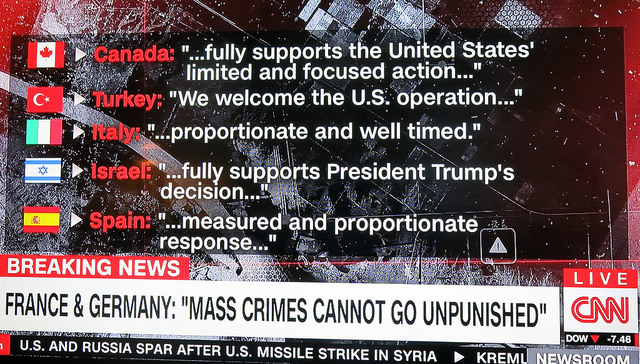Last month’s Rio+20 summit, the latest in a series of international meetings intended to combat climate change, amounted to yet another hopeless failure. No surprise there. While the G20 gatherings and World Economic Forums of this world continue to draw major players, Rio+20 was, by-and-large, snubbed.
To the developed world’s political class, the sovereign debt crisis in Europe, the stuttering global economy and the ominous tensions in the Middle East appear to be far more urgent matters to attend to. Mere climate change that will make our present troubles seem trivial remain sidelined in the face of such concerns.
A similarly lax attitude towards the environment has been routinely demonstrated by the corporate sector. Yet, in a break with his predecessor, Rex Tillerson, CEO of Exxon Mobil, recently told attendees at a meeting of the Council on Foreign Relations that he accepted that climate change was real – and caused, or at least exacerbated, by anthropogenic carbon emissions.
It was a welcome concession from the world’s biggest energy corporation. In fact, the turnaround is remarkable given that Exxon Mobil had given money to climate sceptic think tanks and lobbying groups in the US. Perhaps, as the directors of tobacco companies fumblingly did after years of craven self-delusion, Tillerson was beginning to accept that his monster-sized energy company had a lot to answer for?
Not really. Having conceded the existence of the problem in question, Tillerson evinced the rather glib opinion that, despite the coming challenges, the “consequences are manageable”. He added: “We [the human race] have spent our entire existence adapting, OK? So we will adapt to this.”
It is interesting to note that, in Tillerson’s assessment ” there are… more pressing priorities that we as a — as a human being race [sic] and society need to deal with,” such as ending poverty. Instinctively, many would agree, although if one examines serious studies, climate change is set to massively increase the indigence of many in the world, and will spread diseases, flooding, food scarcity and famine. So, stopping or mitigating the effects of climate change in tandem with providing assistance to those due to be affected would look like a reasonable dual strategy. It doesn’t have to be either / or. Perhaps Exxon would like to put their massive profits to good use in this noble cause?
Apparently not. However, Tillerson did suggest some solutions to eradicate developing world poverty. “You’d save millions upon millions of lives by making fossil fuels more available to a lot of the part of the world that doesn’t have it” he suggested.
Lets address what’s in store if we do nothing. If there is a rise in temperatures of two degrees centigrade or more, something that looks highly likely, “a third of the world’s species will become extinct,” intensifying what is already the present extinction drive since long before we evolved. Additionally, “half a billion people will be at greater risk of starvation” with wars, droughts, crop failure and water shortages a very likely consequence. That is, according to predictions drawn from the research of the leading environmentalist Mark Lynas, an authoritative UK government report and the Met Office, compiled by The Guardian’s Alok Jha.
Manhattan, for example, is set to be battered by storms and worsening floods as a result of climate change according to a report by commissioned by the New York State Energy Research and Development Authority. “The risks and the impacts are huge,” Art deGaetano, a climatolgist at Cornell University, told The Guardian. “Clearly areas of the city that are currently inhabited will be uninhabitable with the rising of the sea.” All of this will be part of a process set to begin within only a decade. Other coastal areas, like parts of Bangladesh and China, are in risk of being absolutely trashed. None of these predictions, it should be said, are especially controversial, in the scientific community.
Once global temperatures rise three degrees, however, climate change will appear irreversible. According to Jha, global warming “may run out of control and efforts to mitigate it may be in vain. Millions of square kilometres of Amazon rainforest could burn down, releasing carbon from the wood, leaves and soil and thus making the warming even worse, perhaps by another 1.5C.” The scientist adds that in the 3C scenario, “Billions of people are forced to move from their traditional agricultural lands, in search of scarcer food and water. Around 30-50% less water is available in Africa and around the Mediterranean.”
If the additional 1.5C pushes warming even higher to four to give degrees, the outlook is truly devastating. “Italy, Spain, Greece and Turkey become deserts” at the least alarming end of the scale, Jha states. At 5C, “Most of the tropics, sub-tropics and even lower mid-latitudes are too hot to be inhabitable.”
Is a two degrees or more rise, likely? Yes. According to authoritative sources, a rise in global temperature by an average of two degrees centigrade is what the world should be trying to avoid. Yet, we remain totally on course to bring this about. Back in 2006, the Stern Report, an exhaustive UK government study, warned that there was “a 50% chance that average global temperatures could rise by five degrees Celsius.”
Underlining how little time we may have left, an authoritative report produced by the International Energy Agency (IEA) last year warned grimly that the world has roughly five years to limit the vast carbon outputs produced by fossil-fuel burning infrastructure and other polluters or face the “irreversible” effects of destructive climate change. “The door is closing,” Fatih Birol, the IEA’s chief economist was quoted as warning, adding that it soon “will be closed forever” if trends are not reversed. The IEA are considered to be the foremost international authority on energy economics. Rio+20, alas, produced no substantial commitments to stop the march toward disaster.
The imperatives of the economy have far too much influence on government policies. Pressed by predictably corporate interests, governments have far too little room to manoeuvre if it means curbing profits. Such pressures are not just market-driven. In the present context, jobs and the economy are equally high on the public’s agenda, exercising equivalent and collaborative pressure to sideline the adoption of policies aimed at combating climate change. When the leading emitters are either in economic turmoil (the EU,) recovering from it (North America,) or are fast-developing economies hungry for more growth (BRIC nations,) there is even less incentive to adopt measures that will be feared as constraining growth.
Future generations may not have any opt out options, though. Indeed, the current economic morass that Europe finds itself in will be incomparable to a globalized economy impacted by massively depleted resources, the immiseration of millions, and the desertification of entire countries. That’s no strategy for prosperity, obviously. However, neither are the policies of avoidance being adopted as default by the G20, either.
Photograph courtesy of Dave Burnham. Published under a Creative Commons license.





